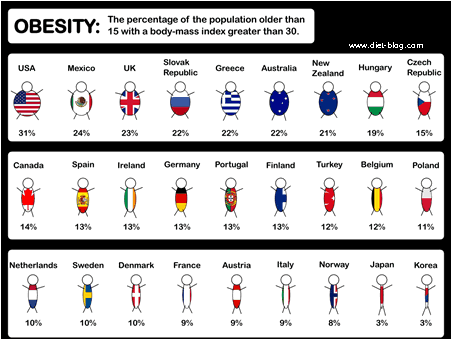Those of us in the U.S. are reminded of our country’s obesity problem nearly every day, but rising obesity rates are not uniquely American. In fact, a few years back, there was a phrase coined by the World Health Organization (WHO) to identify a worldwide epidemic – globesity.
We only have to look at our neighbors to the south to see that we are not alone. Mexico ranks right up at the top with the U.S. in the worldwide rankings of the most obese countries on the planet. In fact, the country’s Health Secretary, Jose Cordova, has expressed his concerns about the impact of his country’s growing diabetes epidemic. Pfizer’s launch of its Exubera inhaled insulin product in Mexico last year shows that there is a real demand, and a real obesity problem.
There is a growing polarization in worldwide nutrition. That is, there are the millions of starving people in third world and developing countries, and then there are the more than one billion overweight adults, at least 300 million of whom are obese.
In a country that has a significant issue with poverty, it seems to baffle the mind to think that Mexico could be amongst the heaviest populations in the world. According to the World Bank, extreme poverty has been cut from about 24 to 17 percent of the general population and from 42 to 27 percent in rural areas. This is accounted for by an expanding economy, boosted largely by free trade agreements such as NAFTA. Not to mention an estimated $20 billion that is remitted from Mexican workers in the U.S.
Economic issues still come into play. British newspaper The Guardian reports that 80 percent of Mexican schools don’t have access to drinking water. This is made up for by substituting soft drinks. Mexico is one of the world’s largest consumers of sugary carbonated drinks.
So maybe it comes as no surprise that companies like Pepsi and Coca Cola are trying to step in and play the good guys by advocating healthier living through exercise with school kids. Don’t expect them to plop down any money to help find ways to get clean water in schools.
Figures from a 2006 national survey stated that more than a quarter of Mexican children between five and 11 are too heavy – a 40 percent increase since 2000. It also revealed that 72 percent of Mexican adults are now over overweight or obese, which is slightly higher than in the U.S. That’s one statistic that Mexico would prefer not to compete with us on.
Check out Shaq’s Family Challenge to learn more about getting your entire family in shape- no matter where you might call home.

